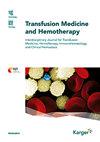PharmaNews
IF 1.9
4区 医学
Q3 HEMATOLOGY
引用次数: 0
Abstract
Das Coronavirus SARS-CoV-2, das Anfang 2020 als Auslöser einer potenziell lebensbedrohlichen Multiorganerkrankung identifiziert wurde und seither für die Entwicklung einer weltweiten Pandemie verantwortlich ist, hält auch die Community der Gefäßspezialisten im Atem. COVID-19-Patienten weisen ein erhebliches Risiko für Thromboembolien auf. Das gehäufte Auftreten venöser Thromboembolien (VTE) wurde nicht nur bei stationären, sondern auch bei ambulanten COVID-19Patienten beobachtet [1]. Dementsprechend empfehlen die DGA (Deutsche Gesellschaft für Angiologie) [2] und GTH (Gesellschaft für Thromboseund Hämostaseforschung) [3] allen hospitalisierten Patienten mit SARS-CoV-2-Infektion eine medikamentöse Hochrisiko-VTE-Prophylaxe mit niedermolekularen Heparinen (NMH) wie Tinzaparin, sofern keine Kontraindikationen bestehen, wie Prof. Dr. Edelgard Lindhoff-Last, Frankfurt, betonte. Eine prolongierte ambulante NMH-Gabe ist gegebenenfalls für Hochrisikopatienten [2, 3] (unter anderem stattgehabte VTE, aktive Tumorerkrankung, Body Mass Index (BMI) > 30–35 kg/m2) sinnvoll, was auch im Arztbrief kommuniziert werden sollte [3]. Wie eine aktuelle, retrospektive Studie aus den USA anhand von Daten einer großen Kohorte von COVID-19-Patienten (n = 4389) zeigt, resultierte eine stationär durchgeführte Antikoagulation mit NMH – sowohl in prophylaktischen als auch in therapeutischen Dosen – in einer geringeren Mortalität und Entwicklung von Intubationspflichtigkeit [4].PharmaNews
冠状病毒严重急性呼吸系统综合征冠状病毒2型在2020年初被确定为一种可能危及生命的多器官疾病的诱因,此后一直是全球大流行的发展原因,它也让血管专家群体保持了呼吸。新冠肺炎患者有显著的血栓栓塞风险。不仅在住院患者中,而且在门诊新冠肺炎患者中观察到静脉血栓栓塞(VTE)的发病率增加[1]。因此,DGA(Deutsche Gesellschaft für Angiologie)[2]和GTH(Gesellshaft für Thrombose und Haemostasiesforschung)[3]建议使用小分子肝素(NMH)(如廷扎帕林)预防高危药物VTE,除非存在禁忌症,如Edelgard Lindhoff Last教授,法兰克福强调长期门诊NMH给药可能对高危患者有用[2,3](包括VTE、活动性肿瘤疾病、体重指数(BMI)>30-35 kg/m2),也应在医生的信中告知[3]。正如美国最近的一项回顾性研究所显示的那样,根据新冠肺炎患者(n4389)的大量队列数据,NMH的预防和治疗剂量的住院抗凝治疗可降低死亡率和插管义务[4]。
本文章由计算机程序翻译,如有差异,请以英文原文为准。
求助全文
约1分钟内获得全文
求助全文
来源期刊
CiteScore
4.00
自引率
9.10%
发文量
47
审稿时长
6-12 weeks
期刊介绍:
This journal is devoted to all areas of transfusion medicine. These include the quality and security of blood products, therapy with blood components and plasma derivatives, transfusion-related questions in transplantation, stem cell manipulation, therapeutic and diagnostic problems of homeostasis, immuno-hematological investigations, and legal aspects of the production of blood products as well as hemotherapy. Both comprehensive reviews and primary publications that detail the newest work in transfusion medicine and hemotherapy promote the international exchange of knowledge within these disciplines. Consistent with this goal, continuing clinical education is also specifically addressed.

 求助内容:
求助内容: 应助结果提醒方式:
应助结果提醒方式:


